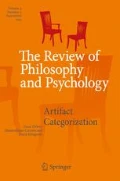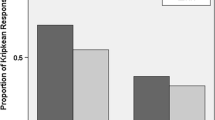Abstract
The Knobe effect is the phenomenon demonstrated in the course of repeated studies showing that moral valence affects the way in which we apply concepts. Knobe explains the effect by appealing to the nature of the concepts themselves: whether they actually apply in some situation depends upon the moral valence of some element of that situation. In this paper, a different picture of the effect is presented and given motivation. It is suggested that subjects apply concepts on the basis of substitution inferences. It is attempted to show that this picture is incompatible with, but preferable to, Knobe’s theory. In closing, some further observations and suggestions are given with respect to further research into the apparent effect of moral valence.
Similar content being viewed by others
Notes
“Each subject rated both statements on a scale from −3 (‘not at all’) to +3 (‘fully’), with the 0 point marked ‘somewhat.’ The mean rating for the statement that the professor caused the problem was 2.2; the mean for the statement that the assistant caused the problem was −1.2.” (Ibid: 4)
I assume for the sake of exposition that there is one, uniform inference made by all subjects responding to the vignettes. It appears that this may not be the case, as Cokely and Feltz (2009) suggest.
This is an empirical claim, but not one I thought worth investigating.
References
Adams, F., and A. Steadman. 2004. Intentional action in ordinary language: Core concept or pragmatic understanding. Analysis 64: 173–181.
Beebe, J., and W. Buckwalter. 2010. The Epistemic Side-Effect Effect. Mind & Language 25: 474–498.
Beebe, J. and Jensen, M. “Surprising connections between knowledge and intentional action: The robustness of the epistemic side-effect effect.” Unpublished manuscript. University at Buffalo, SUNY.
Brogaard , B. 2010. Stupid people deserve what they get: the effects of personality assessment on judgments of intentional action. Behavioral and Brain Sciences 33:332–334.
Cokely, E.T., and A. Feltz. 2009. Individual differences, judgment biases, and Theory-of-Mind: Deconstructing the intentional action side effect asymmetry. Journal of Research in Personality 43: 18–24.
Hitchcock, C. and J. Knobe. 2009. Cause and Norm. Journal of Philosophy 106(11): 587–612.
Knobe, J. 2003. Intentional action and side effects in ordinary language. Analysis 63: 190–193.
Knobe, J. 2004. Folk psychology and folk morality: response to critics. Journal of Theoretical and Philosophical Psychology 24: 270–279.
Knobe, J. 2009. Folk Judgments of Causation. Studies in the History and Philosophy of Science 40(2): 238–242.
Knobe, J. 2010a. Person as scientist, person as moralist. The Behavioral and Brain Sciences 33: 315–329.
Knobe, J. 2010b. Action Trees and Moral Judgment. Topics in Cognitive Science 2: 555–578.
Knobe, J., and B. Fraser. 2008. Causal judgment and moral judgment: Two experiments. In Moral psychology, ed. W. Sinnott-Armstrong, 441–448. Cambridge: MIT Press.
Knobe, J. and D. Pettit. 2009. The Pervasive Impact of Moral Judgment. Mind and Language 24(5): 586–604.
Machery, E. 2008. The folk concept of intentional action: Philosophical and experimental issues. Mind and Language 23: 165–189.
Nadelhoffer, T. 2004. On praise, side effects, and folk ascriptions of intentionality. The Journal of Theoretical and Philosophical Psychology 24: 196–213.
Sripada, C.S. 2009. The deep self model and asymmetries in folk judgments about intentional action. Philosophical Studies, 159–276.
Tannenbaum, D., P.H. Ditto, and D.A. Pizarro. 2007. Different moral values produce different judgments of intentional action. Irvine: University of California. Unpublished manuscript.
Ulatowski, N. (unpublished). How Many Theories of Act Individuation Are There?. Ph.D. Dissertation. Department of Philosophy, University of Utah.Web. <http://faculty.weber.edu/joeulatowski/papers/fulldraftFINAL.pdf>.
Acknowledgements
The following gave helpful comments on earlier drafts and presentations of this material: Shane Babcock, James Beebe, Wesley Buckwalter, Peter Carruthers, Roberto Casati, Theodore Everett, Michael Gifford, Michael Hunter, Benjamin Kozuch, Michael Levin, Hilary Martin, Patrick Ray, Thomas Reynolds, Travis Rodgers, David Sackris, and audiences at SUNY Buffalo, Texas Tech University, CUNY Graduate Center, York University and two anonymous referees.
Author information
Authors and Affiliations
Corresponding author
Rights and permissions
About this article
Cite this article
McGrath, C. Can Substitution Inferences Explain the Knobe Effect?. Rev.Phil.Psych. 2, 667–679 (2011). https://doi.org/10.1007/s13164-011-0061-4
Published:
Issue Date:
DOI: https://doi.org/10.1007/s13164-011-0061-4




